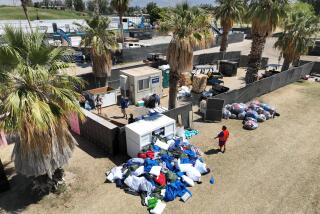Generosity of Passers-by Aids Quake Victims
- Share via
ARMENIA, Colombia — The generosity of passing motorists on Friday kept hope alive for residents of a Colombian tent city that fills a half-mile stretch of highway median on the way out of this earthquake-devastated city.
Barefoot children sprinted out of a tent when men stopped to pass out goods from a Renault hatchback brimming with diapers, blankets, candles and toilet paper. A boy in dirty soccer shorts smiled from ear to ear, carrying a bright green blanket to his parents.
Juan Jaramillo, an engineer from Armenia who has been inspecting buildings damaged by Monday’s magnitude-6 earthquake and distributing supplies he collected from family and friends in his spare time, said nobody was leading the aid effort.
“We’re taking it upon ourselves to help out,” he said.
“Eighty percent of Armenia hasn’t gotten anything,” he said. “What they have is what private people have been giving them.”
The government relief effort, although substantial, has been hampered by confusion, lack of personnel and vehicles. In short, it has been overwhelmed by the magnitude of need in this city of 300,000, which was the hardest hit by the quake that killed at least 940 people and injured 3,690 nationwide, according to the Red Cross.
In the hundreds of makeshift tents on the highway median above Armenia’s Buenos Aires shantytown, people are forced to live off the help of passers-by.
William Benavides, a typewriter repairman who lives in a damaged bamboo home on a steep ravine below the highway, said it is safer to be up by the road, far from the thieves reported to be roaming the shantytowns, and near “where the food passes by.”
He said there are also advantages to being so visible to the public. “We’re suffering up there, but we also put pressure on the government to take care of us,” he said.
There even was a bit of humor amid the misery on the muddy, overcrowded median.
“Welcome to my Swiss chalet,” quipped 39-year-old quarry worker Luis Ernesto Hoyos, emerging from an A-frame bamboo and plastic shelter that has been home for his family of four since the quake caused menacing cracks in the house they rented nearby.
Up the road, Ana Celia Aviloa’s wishes came true when two men in a rickety old truck pulled up beside her tiny lean-to and handed out garbage bags with panela, the brown sugar Colombians use to sweeten just about everything.
“We’ve been dying for some,” Aviloa said, grinning broadly.
More to Read
Sign up for Essential California
The most important California stories and recommendations in your inbox every morning.
You may occasionally receive promotional content from the Los Angeles Times.










